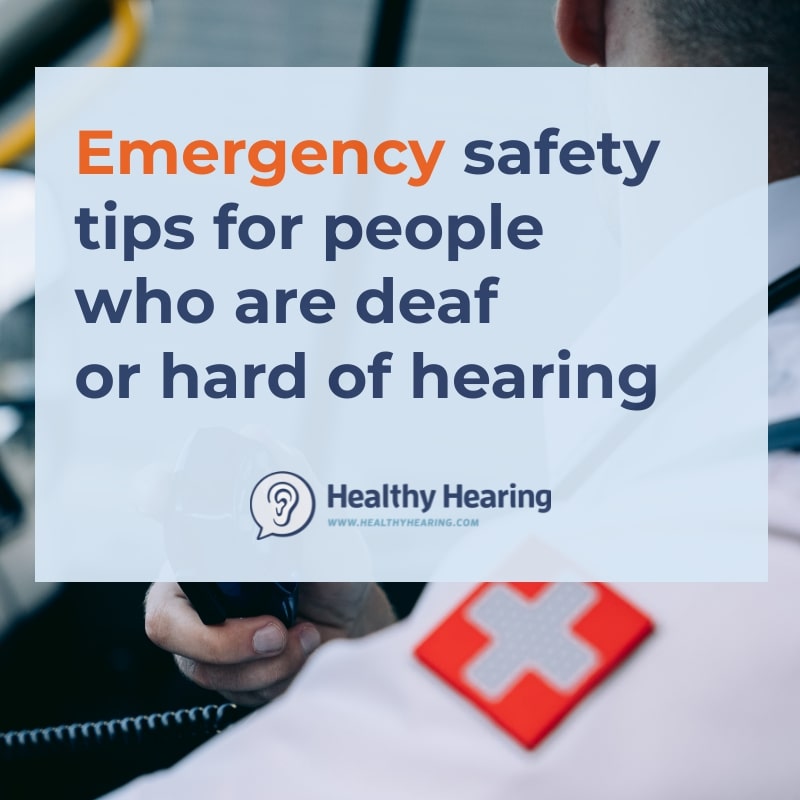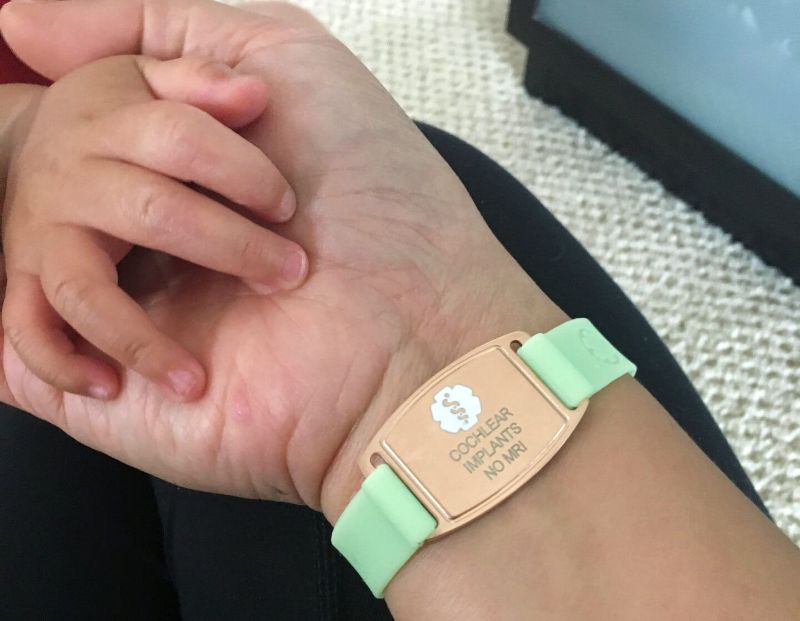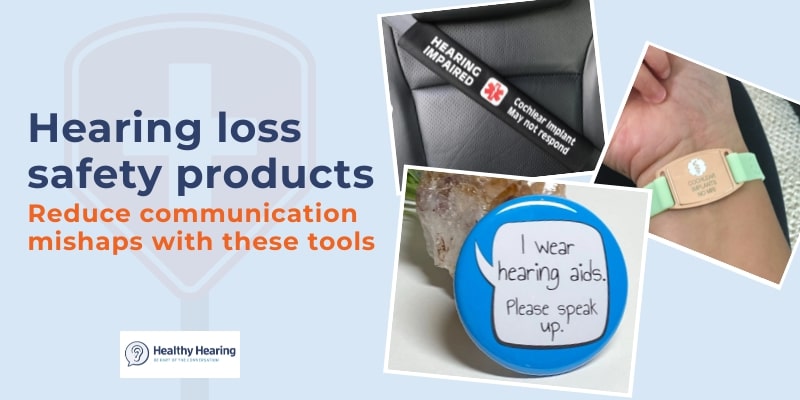|
www.HealthyHearing.com |
Emergency communication tips when you have hearing lossStart by planning ahead
Contributed by Madeleine Burry Communicating during emergencies is deeply challenging: blaring sirens, stressful situations, and downed phone lines are all contributing factors that can make it hard to speak, hear, or think clearly. For people who are deaf or hard of hearing, there’s an extra layer of complexity and additional obstacles, including: Communication challenges during emergencies or disastersDifficulty hearing emergency alerts
For hearing people, the scream of a siren is loud—often uncomfortably so, prompting people to cover their ears. That’s not necessarily the case for anyone with impaired hearing. “Depending on someone’s severity of hearing loss they may not hear emergency alerts well such as fire alarms, smoke detectors, and emergency vehicle sirens,” says Sarah Lundstrom, audiologist at HearCare Audiology and a fellow of the American Academy of Audiology. More likely to miss subtle cues that signal dangerIt’s not just sirens that announce danger. “Our hearing also provides a sense of environmental awareness, to pick up any subtle cues of approaching danger such as a home intruder, water leak, or elevator malfunction,” says Hadassah Kupfer, AuD, CCC-A. And, hearing also provides directional information, she points out. With limited hearing, a person may walk toward a dangerous situation unknowingly. Hearing and talking to first respondersAnother challenge can be hearing instructions from first responders, or taking in the questions they’re asking. Here, Lundstrom and Kupfer share tips for how to plan ahead for emergencies, along with communication tips for during a crisis moment. Preparation is keyBy nature, emergencies are often unexpected—people don’t intend to have car accidents or medical crises or to encounter natural disasters. But you can prepare for how you’ll handle unexpected situations. “[Have] a plan on where to go and what steps to follow during an emergency,” Lundstrom says. Consider having a go-bag in place (more on that shortly), a meeting spot pre-arranged, and all the other recommended steps for emergency prep. “It may be helpful to discuss emergency plans with a friendly neighbor and request that they check in on you in case they hear your alarm,” Kupfer says. Here are other safety-related tactics to implement: Update alarms and other safety devicesSmoke alarms and carbon monoxide meters that emit beeps when they detect danger aren’t necessarily helpful for people with hearing loss. “People with hearing loss should make sure they can perceive their home alarms—whether that means getting something with extra amplification, or changing the pitch of the alarm to make it easier to pick up,” Kupfer says. Alerting devices—including smoke alarms for people with hearing loss—are available that use lower frequency sounds, emit a visual cue, or incorporate vibrotactile elements. Visual or tactile systems, such as a doorbell that blinks a light or an alarm that makes the bed shake, are “helpful since most people don't wear their hearing aids to sleep,” Kupfer says. Keep your hearing aids handyJust the act of wearing hearing aids if you need them is helpful—doing so helps you hear signs of danger and ups your ability to communicate. But of course, those hearing aids can’t help without power. “Make sure your hearing devices are charged or have fresh batteries and are well maintained,” Lundstrom says. Plus, consider charging them near your bed for easy access in a middle-of-the-night emergency. If you’re in an area prone to earthquakes, secure their container to your bedside table so they won’t fall off if furniture shakes and wobbles. “If needed, keep spare batteries in various places for emergencies, like in your car or a purse,” Lundstrom says. For rechargeable hearing aids, consider getting a portable power bank, which can be stored in your go-bag (or car) for easy access. Sign up for emergency alerts“When possible, sign up for text alerts rather than phone alerts, so emergency messages are abundantly clear,” Kupfer says. Consider a medical bracelet
condition to first responders. This functional jewelry can alert people, including first responders or emergency room staff, to your name and hearing loss. For anyone with an invisible disability—like hearing loss or an allergy to medication—a medical ID bracelet (or necklace) offers valuable information. You can include details on the medications you take, the specifics of your hearing loss (for instance, if you wear cochlear implants or use hearing aids), and other important health information. Keep communication support in your go bagIf you have an emergency bag, include a power source for your hearing aids inside it, along with pen and paper to aid communication. If you sign, bring flashlights and batteries so that hands can be visible, per the National Campaign for Better Hearing in Canada. Flashlights can also be helpful if you lipread. Other good go bag items include waterproof containers for hearing aids or cochlear implants, according to the National Campaign for Better Hearing, as well as pre-printed communication cards. During an emergency situation, you’ll need to “be extra vigilant so you can use alternate cues from your other senses,” Kupfer says. Here’s a few other strategies to keep in mind:
Hearing loss safety products
The best products for telling others you have hearing loss - your safety may depend on it This in-depth piece includes items you may want to purchase to stay safe in emergencies, or otherwise easily and quickly let others know you have hearing loss or are Deaf. Coping with hearing aid issuesIf your hearing aids are damaged or malfunction in an emergency, rely on your other senses for help. Get close to speakers, Kupfer says. “Ask them to speak up, speak slowly and enunciate—and then focus on their face and try to lipread to the best of your abilities. Try to minimize unnecessary background noise such as television, or walk away from the loud noise source if outdoors.” Other tactics to try: use your hands to cup around your ear, Kupfer says. This will give you “a small boost in volume.” And repeat back what you hear so that the speaker can confirm or correct, she recommends. Finally, don’t forget the other tools you might have: Open up a blank email in your phone or tablet, and ask the speaker to type answers. Or, use a pen and paper to aid communications. Tips for caretakersIf you have a loved one who is hard of hearing, here’s how you can offer help in an emergency:
Inform first responders in advanceJennifer Thoreson, an EMT with the Mayville EMS in Wisconsin, recommends people with communication barriers contact their local non-emergency police phone number and ask if there’s a system to notify police and EMTs that there are special needs at that address. “We actually have a county-wide system called Smart 911 that allows us to register through this system to alert law enforcement and anyone responding to an address or phone number of any medical issues a caller might have,” she says. It's also a good idea to make sure your hearing loss is documented in your medical records, which can be very helpful information for doctors. More: Smartphone apps that caption live speech can be handy in emergency communication situations, too. Note: Freelance author Jenna Glatzer contributed to this article. Madeleine Burry
|
Featured clinics near me
Earzlink Hearing Care - Reynoldsburg
7668 Slate Ridge Blvd
Reynoldsburg, OH 43068

Find a clinic
Need a hearing test but not sure which clinic to choose?
Call 1-877-872-7165 for help setting up a hearing test appointment.



 Madeleine Burry is a Brooklyn-based freelance writer and editor. She's written about health for several online publications, including Women's Health, Prevention, Health, Livestrong and Good Housekeeping. You can follow her on Twitter @lovelanewest.
Madeleine Burry is a Brooklyn-based freelance writer and editor. She's written about health for several online publications, including Women's Health, Prevention, Health, Livestrong and Good Housekeeping. You can follow her on Twitter @lovelanewest.